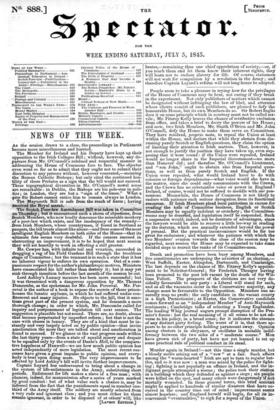NEWS OF THE WEEK.
As the session draws to a close, the proceedings in Parliament 'become more miscellaneous and hurried.
The Member for Ireland and his Deputy have kept up their opposition to the Irish Colleges Bill ; without, however, any de- parture from Mr. O'Connell's subdued and respectful manner in addressing the Howe of Commons face to face. The objector .even went so far as to admit that they ought not to submit their discretion to any persons without, however venerated,—meaning the Roman Catholic Bishops ; but only cited the continued hos- tility of those Prelates as a sign that the bill would not succeed. 'These topographical diversities in Mr. O'Connell's moral sense are remarkable : in Dublin, the Bishops are his pole-star in poli- . tics ; in London, they are but a "sign of the times." What a .pity Sir Robert cannot entice him to remain always in LOndon. The Maynooth Bill is safe from the reach of harm ; having received the Royal assent.
The Scotch Poor-law Amendment Bill was taken in Committee on Thursday; but it encountered such a storm of objections, from Scotch Members, who now loudly denounce the miserable mockery of a poor-law which exists, and the inadequacy of the remedy- ifrom Irish Members, whose countrymen, if found in Scotland as . paupers, the bill treats almost like aliens—and from some of the most intelligent English Members on both sides of the House—that its ultimate fate seems very doubtful. If the censors succeed in obstructing an improvement, it is to be hoped that next session they will set heartily to work in effecting a still greater. Mr. Cowper his' with infinite toil and vexation, succeeded in dragging a rag of his Field Gardens Bill through the troublous stage of Committee ; but the remnant is in such a state that it has no inherent vigour to enforce its own operation. Out of a com- passionate respect for the author's philanthropic motives, Ministers have emasculated his bill rather than destroy it ; but it may yet sink through inanition before the last month of the session be out. Lord Ashley's Lunacy measure has been more successful ; but it was threatened with a dangerous opposition by Mr. Thomas Duncombe, as the spokesman for Mr. John Perceval. Mr. Per- ceval is the author of a book to expose the secrets of those prison- houses the lunatic asylums, in which he had suffered undue con- finement and many injuries. He objects to thejill, that it sanc- tions great part of the present system, and he demands a more thorough change; in order to which, Mr. Duncombe called for inquiry and postponement of legislation till next session. The suggestion is plausible but not sound. There are, no doubt, abuses that become perpetuated by imperfect reform • but that is not the case with abuses in lunacy. They are of a kind that must be in- stantly and very largely acted on by public opinion—that invite amelioration the more they are talked about and amelioration is found to succeed. If we glance at the vast progress made within the last thirty years—from a state of squalid misery and despair to be equalled only by the events of Dante's Hell, to the compara- tive happiness of Hanwell—we see how much public opinion has acted independently of mere legislation. The most recent suc- cesses have given a great impulse to public opinion, and every- body is bent upon doing more. The very improvements to be effected by Lord Ashley's bill will invite further improvements.
Captain Layard has endeavoured to bring about a change in the system of life-enlistments in the Army, substituting short periods. Enlistment for life makes a slave of a freeman; with chances, indeed, for manumission after a series of years marked by good conduct : but of what value such a chance is, may be inferred from the fact that the punishments equal in number one- third of the Army itself. The soldiery are mostly selected from a very rude and ignorant class ; and you must either let them remain ignorant, in order to be disposed- of at others' will, like brutes —remaining thus one chief opprobrium of society,—or, if you teach them and let them know their inherent rights, they will learn not to endure slavery for life. Of course, statesmen will not wait for compulsion by a revolution in the Army ; and therefore Captain Layard's reform will not long hence be adopted.


























